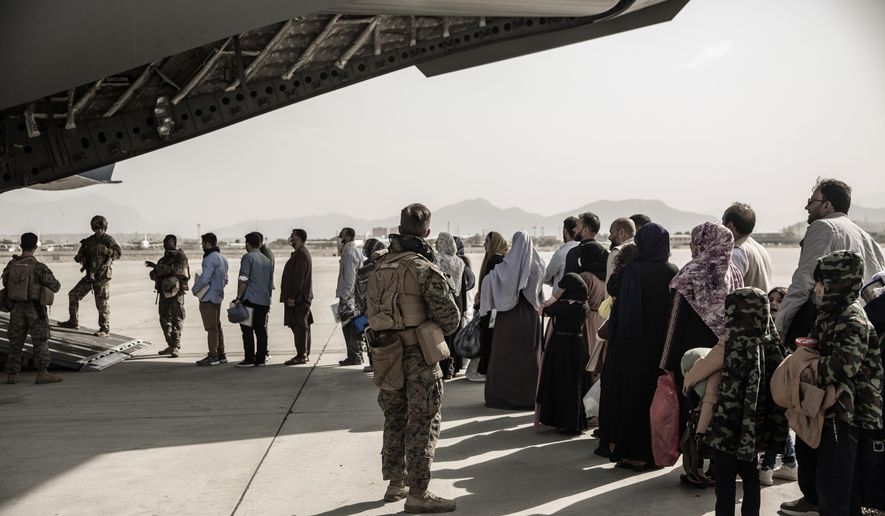Afghan evacuees made it to U.S. soil without being checked through all the government’s security databases, an inspector general reported Thursday in a devastating investigation that confirms critics’ worst fears about the program.
After rerunning some of the names, officials spotted at least 50 Afghans with “potentially significant security concerns” who made it to the U.S. despite the Biden administration’s assurances to the contrary.
Making matters worse, the government appears to have lost track of most of them, the Defense Department’s inspector general said. It looked at a sampling of 31 security risk evacuees identified as of Sept. 17 and found that only three could be located.
Tens of thousands more names remain to be checked, the inspector general said.
“Not being able to locate Afghan evacuees with derogatory information quickly and accurately could pose a security risk to the United States,” the audit concluded.
Investigators said a key set of Defense Department databases was off-limits to the vetting team in the early months of the evacuation program because of Pentagon agreements with other countries.
SEE ALSO: Senators call on State Department to release Afghanistan withdrawal dissent cable
Officials eventually developed a workaround, but the lapse confirmed what critics had warned.
“I expressed concern about the administration’s lackluster efforts to screen evacuees flooding from the terrorist safe haven. According to a new report by the Pentagon watchdog, the situation is far worse than we thought,” said Sen. Chuck Grassley of Iowa, the top Republican on the Senate Judiciary Committee.
He said the report should put a halt to talk of speeding up citizenship or other permanent legal opportunities for the evacuees.
What lurks among the 76,000 evacuees in the U.S. has raised concern since the chaotic airlift in August.
The airlift was billed as a chance to save people who worked with the U.S. military, but the majority of evacuees lacked those ties. Some assisted other U.S. agencies or American media organizations, but others were, according to one evacuation advocacy group, shopkeepers and businesspeople from Kabul who were lucky enough to make it to the airport on time.
Thousands of U.S. military allies were stranded.
Most of the evacuees brought to the U.S. did not have the in-person interviews required for refugees and allies under the Special Immigrant Visa program. Experts say the interview process is critical to weed out bad actors.
Instead, the evacuees were brought to third countries and subjected to database checks based on fingerprints and other biographic information they chose to share.
“We screen and vet individuals before they board planes to travel to the United States, and that screening and vetting process is an ongoing one and multilayered,” Homeland Security Secretary Alejandro Mayorkas said in September in defense of the process.
The inspector general’s report punctures those claims. Although the Homeland Security Department checked its own databases, it didn’t initially have access to the Defense Department’s Automated Biometric Identification System or some intelligence databases on the Secret Internet Protocol Router Network.
The Defense Department played a supporting role to Homeland Security in vetting, but it led the process of housing evacuees by stuffing them into camps at eight military bases across the country.
The inspector general confirmed reporting by The Washington Times and others that Afghans were free to leave. A month after the airlift ended, more than 1,200 had disappeared into the U.S. without completing full Homeland Security processing.
The audit suggested two changes.
First, it urged that the workaround to allow access to secret Defense Department files be extended until all vetting is complete. The Pentagon agreed with that recommendation.
Second, the inspector general said the undersecretary of defense for intelligence and security should come up with firm procedures for sharing “derogatory information” on Afghan evacuees with the rest of the Defense Department and other federal agencies. The undersecretary’s office agreed with that proposal.
• Stephen Dinan can be reached at sdinan@washingtontimes.com.




Please read our comment policy before commenting.